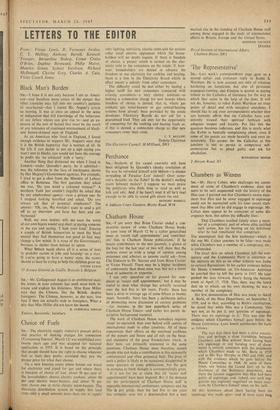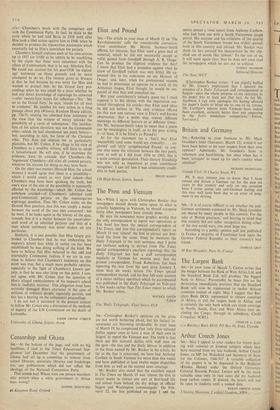Chambers as Witness
SIR,—Mr. Harry Cohen, who challenges my assess- ment of some of Chambers's evidence, does not seem to be well acquainted with the history of the Hiss case. 1 pointed out that Chambers's sworn state- ment that Hiss and he never engaged in espionage could not be reconciled with his later sworn state- ment that Hiss and he did engage in espionage. Mr. Cohen does appear to be conscious of some dis- crepancy here, but solves the difficulty thus:
That Chambers testified falsely when a mem- ber of a conspiracy, part of whose ethic justified such action, has no bearing on his testimony after he had repudiated that conspiracy.
The assumption that the first testimony—which is the one Mr. Cohen assumes to be false—was made while Chambers was a member of a conspiracy, etc., is unfounded.
The exact date on which Chambers left the con- spiracy and the Communist Party is uncertain as his memory on this as on other subjects was liable to curious fluctuations. In his earlier evidence before the House Committee on Un-American Activities he asserted that he left the party in 1937. He later pushed the date forward, finally fixing the historic event at April 15, 1938. This, then, was the latest date up to which, on his own showing, he was a member of the conspiracy.
His first denunciation of Hiss was made to Adolf A. Berle. of the State Department, on September 2, 1939, and in that, according to Berle's recollection, he stated that while Hiss was a Communist, 'this. was not, as he put it, any question of espionage. There was no espionage in it.' This was also the evidence which Chambers himself gave before the House Committee. Lord Jowitt summarises the facts as follows:
The fact that there had been a close associa- tion, and perhaps a close friendship, between
Chambers and Hiss without there having been any espionage or any handing over of docu- ments is entirely consistent with the statements which Chambers made to Mr. Berle in 1939 and to Mr. Ray Murphy in 1945 and 1946. and with the evidence which he gave before the House Committee in 1948. At none of these times, nor before the Grand Jury up to the disclosure of the Baltimore documents, was there the faintest suggestion that Hiss had been guilty of espionage, and, indeed, any such sug- gestion was expressly negatived on many occa- sions by Chambers himself when on his oath.
All this testimony about there having been no espionage was made after-- and id most cases long
after—Chambers's break with the conspiracy and with the Communist Party. In fact, he stuck to the story which he had told Berle in 1939 until after Hiss took a libel action against him in 1948, when he decided to produce the typewritten documents which eventually led to Hiss's conviction for perjury.
Chambers himself explains such of his own actions
up to 1937 (or 1938) as he admits to be unedifying by the claim that these were cqnsistent with the ethics of Communism, that is to say, Absolute Evil. He could not account for his post-1938 'no espion- age' testimony on 'those grounds and he never attempted to do so. The version given in Witness is that he lied because he was sorry for Hiss and wanted to protect him. In the Grand Jury pro- ceedings when he was asked by a juror whether he had any direct knowledge of espionage he answered —after twenty-four hours for reflectipn—'No. "My no to the Grand Jury,' he says, 'stands for all men to condemn. He justifies his own action in a long passage about pity (Witness, Random House edition, pp. 726-7), relating his admitted false testimony to the view that 'the witness of mercy unlocks the possibility of a cycle of redemption.' The justifica- tion of his action therefore was not the Communist ethic—which he had abandoned ten years before—
but, according to him, his form of the Christian ethic. This does not impress me as particularly plausible, but Mr. Cohen, if he clings to his view of Chambers as a credible witness, will have to adopt it henceforward. He will also, if he examines the evidence, have to concede that ChaMbers—the 'regenerate' Chambers—did after all commit perjury, whatever his reasons for doing so may have been.
On the other two matters (Donald Hiss; the school money) I would agree that there is a possibility— which I would assess as very faint indeed—that Chambers may have been speaking the truth, but one's view of the size of the possibility is necessarily affected by the knowledge—which Mr. Cohen has somehow avoided—of Chambers's admitted (and post-Communist) perjury on the espionage/no espionage question. Thus Mr. Cohen states, on the • Donald Hiss question, that this was 'simply a matter between the word of the two men concerned'; but he must, if he looks again at the history of the case, concede that it is a matter between the uncorrobor- ated word of an admitted perjurer and that of a man whose testimony was never shaken on any particular.
Similarly, it is just possible that Hiss falsely pre- tended to Chambers that he was embezzling his stepson's school fees while in reality (as has been established) he was doing nothing, of the kind. We have to believe that Hiss behaved in this odd and inscrutably Communist fashion if we are to con- tinue to believe that Chambers's testimony on this point was true, but a much more probable opinion, especially in the light of Chambers's known per- jury, is that he was also lying on this point. I can- not agree with Mr. Cohen that the question of Hiss's alleged embezzlement of his stepson's school fees is 'ineffably minimal.' This allegation must have seriously damaged Hiss's character in the eyes of millions of ordinary people, especially parents, and this has a bearing on the subsequent proceedings.
, I do not feel it necessary in the present context to follow Mr. Cohen into a discussion of the methods of inquiry of the UN Commission on the death of Lumumba.
CONOR CRUISE O'BRIEN
University of Ghana, Legon, Accra















































 Previous page
Previous page